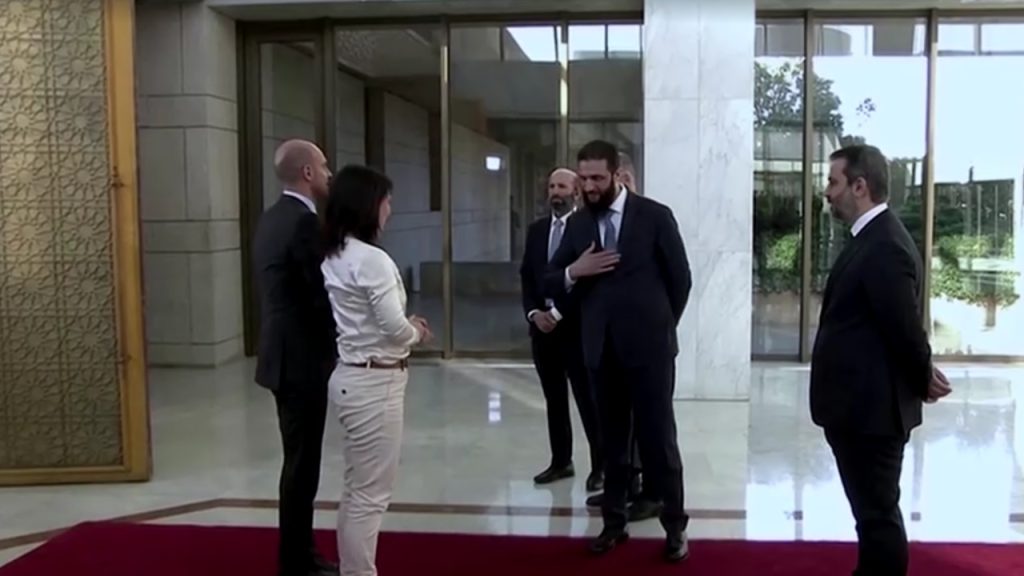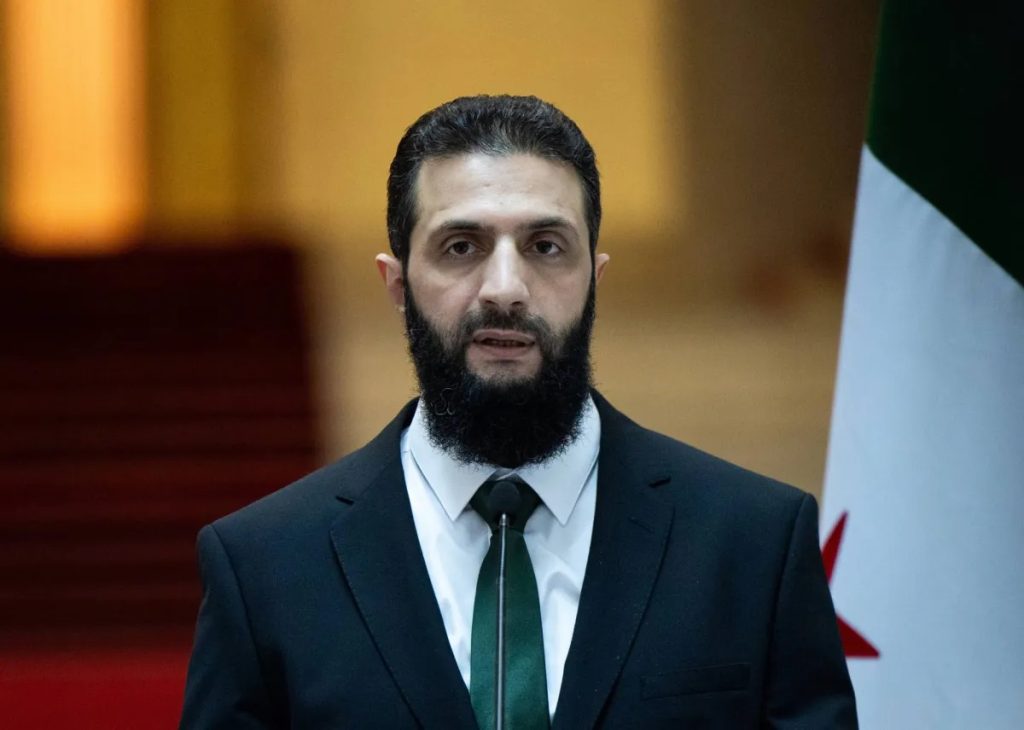European Diplomatic Engagement in Syria: Navigating Sanctions, Aid, and Geopolitical Interests
An In-Depth Analysis of EU Ministerial Visits and Their Impact on Syria’s Future.

Watan–The purpose of the visits to Syria is to lift the sanctions, which are of three different types. The first relates to listing the “Hayat Tahrir al-Sham” on the American and European terrorist lists. The second includes those imposed on the previous regime, some dating back to the era of the late President Hafez al-Assad, and the rest on the regime of the ousted Bashar al-Assad, most of which date back to after 2011.
The requests can be summarized into several points. The first is the establishment of a state based on power-sharing among the sectarian and ethnic components of Syrian society, what is now known as minorities according to the commonly used term, including Christians, Alawites, Druze, and Kurds. The practical translation of this request is the adoption of the quota principle, as implemented in Iraq, and the detailed structuring of the new Syrian state based on it. This entails decentralization, including the legislation of forms of federalism and self-administration.
The Form of the State in Syria
The second request during the visits to Syria is that this state be civil and explicitly not dominated by a single group, specifically not the Islamization of the regime. This trend has begun to emerge through some strongly religious indications, such as the amendments to the curricula published by the Ministry of Education or statements issued by officials in the caretaker government regarding women’s participation, rights, work, and roles. An example of this is the statement made by the Women’s Affairs official, Aisha al-Dibs. According to Western diplomats who visited Syria and met with the head of the new administration, Ahmed al-Shar’a, the Western requests will not be met through quick decisions but rather through a political process led by a transitional government that will achieve the required specifications in the upcoming phase. This was the conclusion of the visit by the Foreign Ministers, French Jean-Noël Baraud and German Annelina Berbek, to Damascus on January 3rd of this year. Berbek sparked a storm of discussion regarding her style and actions that deviated from diplomatic norms, as she disembarked from the German military plane, which had flown her from Cyprus to Damascus, wearing a bulletproof vest, and went to the Republican Palace dressed in attire considered “unofficial.”
The visit of the two ministers left negative impressions among public opinion. Instead of resulting in pressure on the new administration, for which it was intended, it backfired negatively due to what was said by the two ministers, whose actions made it appear that they deliberately bypassed the new administration. The French minister preceded the meeting with al-Shar’a by meeting with representatives of Syrian churches, and the German minister by meeting with Syrian women’s organizations from civil society. Protocol experts believed that the agendas of the two ministers should have been reversed.
The visit marked an important milestone in Syria’s relations with Europe in the foreseeable future for several reasons. The first is that the visit represents all 27 European Union countries, not just France and Germany, which are considered the European powerhouses, the two most important economies, and political forces on the continent. They can either facilitate or hinder any European action. Consequently, they will henceforth form the reference point for European decisions regarding Syria, along with Britain, which shares most of their positions on international issues, despite having officially left the European Union.

The second reason is that these two countries have a more direct connection to Syrian affairs than any other Western party. France is a former mandate power over Syria and maintains solid and deeply rooted historical and cultural relations with it. There are influential Syrian Francophone elites who are economically, politically, and culturally significant. Additionally, Paris has relations with the “Syrian Democratic Forces” (SDF) and maintains a symbolic military presence alongside the SDF in northeastern Syria, conducting air sorties and bombing operations as part of the international coalition war against ISIS. France is betting on leveraging all this influence in a way that serves its interests as a state on one hand, and on the other hand, to empower the parties it considers its allies, at the expense of the central state.
The Aid Proposal Amidst Visits to Syria
As for Germany, amidst the visits to Syria, it is waving the papers of aid and participation in reconstruction. Additionally, Germany is the European country that ranks first in receiving Syrian refugees, who fled their country to escape the war waged by the regime and its allies—the Iranians, Russians, and cross-border militias. The number of these refugees exceeds 750,000. The vast majority of them have managed to adapt to the conditions of life, work, and education in Germany, and a large number have obtained citizenship. They contribute to the labor market and enjoy a good reputation, which has qualified them to constitute the majority of foreign naturalized citizens over the past three years.
The third reason is that neither Germany nor France is in complete harmony with Turkey, which is considered the closest ally of the new administration in Syria. There is a fear in both countries that the new government’s rapprochement with Turkey could lead to a form of alliance, affecting French-German interests and enhancing Turkey’s standing. Turkey maintains a significant presence in the Eastern Mediterranean region, particularly in Syria and Libya. Europe fears that Syria, after the waning of Iranian and Russian influence, could become a stage for Turkish influence, which is approaching Israel.
The fourth reason pertains to the positions of Arab countries, particularly the Gulf Cooperation Council (GCC) states and Egypt. It is important to note that the visit of the two ministers to Syria occurred after the first visit by officials from Syria’s new administration abroad, which was to Saudi Arabia. This visit was undertaken by Syrian Foreign Minister Asaad Shabiha, who visited Riyadh at the invitation of his Saudi counterpart, Prince Faisal bin Farhan. He was accompanied by Defense Minister Marouf Abu Qusra and Intelligence Chief Anas Khattab. The results of this visit were surprising due to the Saudi interest in establishing strong relations with the new government, as well as their keenness on stabilizing Syria and assisting it in overcoming its difficult situation.
In the context of these visits to Syria, the GCC states have poured their attention into stabilizing Syria following the visit by the GCC Secretary-General, Jassim Mohammed al-Badawi, accompanied by Kuwait’s Foreign Minister Abdullah Ali Al-Yahia. In this scenario, there is a positive factor: Syria is transforming into a region that fosters Arab-European understanding.

Egypt’s wavering stance on the changes in Syria did not resonate with France and Germany. Additionally, some Arab circles that support the counter-revolution perceived this as a restraint that encourages caution and diminishes European enthusiasm for engaging with Syria and building a dialogue based on mutual concessions and demands. There is a clear divergence in perspectives regarding the Iranian threat to the Arab world between European capitals and Cairo.
The fifth reason pertains to Israel’s approach in dealing with Syria, which does not seem acceptable to Europeans who declare their support for Syria’s sovereignty over its territories. Europeans reject the recent incursions that followed the fall of the regime and refuse to acknowledge the occupation of the Syrian Golan Heights. However, they encourage finding a settlement between Israel and the new Syrian government without applying any form of pressure on Israel to halt its repeated assaults on Syrian lands and the daily violation of Syrian sovereignty. This situation undermines the stability of the region and opens the door for the resurgence of Iranian efforts to exert influence through resistance.
There is a final reason concerning the stance towards Iran. It appears that Europeans are not aligned with Israelis and Americans on this issue. Despite vehement statements about the necessity for the new Syrian government to take strict measures to prevent Iran’s return to Syria, European-Iranian relations are not severely strained. Europe maintains a good level of understanding, mutual benefits, and the safeguarding of common interests with Iran. Furthermore, despite European sanctions on Iran, communications and meetings between the two parties have not ceased. Evidence of this is the upcoming meeting in Geneva, Switzerland, regarding the Iranian nuclear program, scheduled for January 13th of this year, between Iran and France, Britain, and Germany. This meeting is set to occur a week before the inauguration of the elected American President Donald Trump on January 20th of this year.
Avoiding Conditions and Impositions
What was expressed by the two ministers during their visits to Syria, along with their actions, does not reflect an intention to help the Syrian people overcome the difficult phase unconditionally and without impositions. Instead, some view it as an attempt to apply a ready-made formula for intervening in internal affairs, setting traps that lead to the fragmentation of Syria into sectarian and ethnic provinces. At best, it aims to weaken the new government with the intention of seizing its independent decision-making and compelling it to take subsequent political steps, including normalization and signing agreements with Israel that involve recognizing and accepting its occupation of parts of Syrian territories.
Notably, the French Foreign Minister spoke about France’s readiness to assist Syria in drafting a new constitution, fully aware that this matter is sovereign and within the jurisdiction of the Syrian people themselves. The Syrians possess ample expertise in this area and have previous experiences, such as in 1920 when they drafted their first constitution, which was subsequently halted by the French mandate. After achieving independence from France, the Syrians established a new constitution in 1950, which remains valid to this day, and there are some legal references that advocate for its adoption or use as a guideline.
Furthermore, some believe that the French proposal might carry an underlying attempt to impose articles that align with the minister’s propositions concerning the structure of the new Syrian state.






